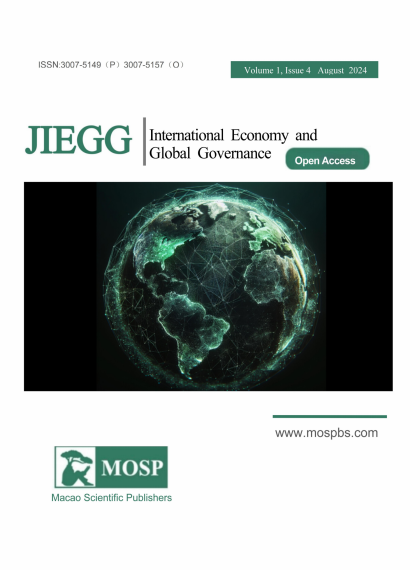-
Fu, Q., Zou, H., Hu, Z., et al. (2023). Model construction and comprehensive evaluation of financial competitiveness of Chinese sports listed companies: An empirical analysis based on financial panel data of 26 representative sports listed companies. Journal of Sports Education, 39(5), 39-48+95.
-
Ruan, Y., Ye, S. W., & Lu, Y. Z., et al. (2022). Empirical study on the impact of the digital economy on the high-quality development of the sports industry—Taking panel data from 14 provincial administrative regions as examples. Journal of Guangzhou Sport University, 42(5), 49-58.
-
Hackenberg, J. (2021). How technology can help sport boost its green credentials. Engineering & Technology, 16(11), 15-15.
-
Dai, J., & Zhu, Q. (2024). ESG performance and green innovation in a digital transformation perspective. American Journal of Economics and Sociology, 83(1), 263-282.
-
Kwilinski, A., Oleksii, L., & Pimonenko, T. (2023). Unlocking Sustainable Value through Digital Transformation: An Examination of ESG Performance. Information, 14, 444.
-
Ge, G., Xiao, X., & Li, Z. (2022). Does ESG Performance Promote High-Quality Development of Enterprises in China? The Mediating Role of Innovation Input. Sustainability, 14(7), 3843.
-
Yang, Z., Li, D., & Chen, Y. (2024). Research on the "Green Swan" Risk in Financial Markets: Based on the Dual Perspectives of Physical Risk and Transition Risk. Journal of Management World, 40(2), 47-63.
-
Wang, Y. H., & Guo, Y. Z. (2023). Enterprise digital transformation and ESG performance—Based on empirical evidence from Chinese listed companies. Journal of Finance and Economics, 49(9), 94-108.
-
Chai, W. J., Gong, Z. H., & Shi, H. X., et al. (2023). The role mechanism and realization path of digital technology empowering large-scale sports events to achieve carbon neutrality. Journal of Wuhan Sports University, (10), 12-21.
-
Zhong, J. Q., Cui, R. H., & Zhao, W. Z., et al. (2018). Study on the spatial differentiation and its coupling relationship of input-output-efficiency of China's sports industry. Journal of Shenyang Sport University, (1), 41-50.
-
Qin, D., Yang, J., & Du, C. R., et al. (2023). The impact of digitalization on the high-quality development of the sports industry—Based on the U-shaped moderating effect of the institutional environment. Journal of Guangzhou Sport University, 43(4), 13-23.
-
Shen, K. Y., Lin, S. T., & Dong, Q. Q., et al. (2022). The practical requirements, development dilemmas, and practical strategies for the digital transformation of China's sports industry. Journal of Wuhan Sports University, (8), 51-59.
-
Bi, D. T., Huang, W. X., & Wang, L., et al. (2023). How does the development of urban digital economy affect corporate ESG performance? —The urban-enterprise collaborative path for green high-quality development. Scientometrics, (11-17).
-
Wang, D., & Zhang, D. (2023). ESG performance, high-quality development of manufacturing and digital transformation. Statistics and Decision, (19), 172-176.
-
Wen, S. B., & Fang, Y. (2008). An empirical study of the relationship between corporate social responsibility and financial performance: A stakeholder perspective panel data analysis. China Industrial Economy, (10), 150-160.
-
Li, H. Y., Lu, Z. Q., & Yao, H. X. (2009). The mechanism of corporate social responsibility affecting company performance: A theoretical explanation based on social capital. Soft Science, (10), 133-137.
-
Olofsson, P., Rholm, A., & Uddin, G. S., et al. (2021). Ethical and Unethical Investments Under Extreme Market Conditions. International Review of Financial Analysis, (78).
-
Han, Y., & Ma, L. P. (2020). Study on the transformation of industrial structure and economic growth in the stage of high-quality development in China—Based on the logical framework of structure-efficiency-speed. Research on Economics and Management, 41(12), 28-40.
-
Ma, J., Gao, D., & Sun, J. (2022). Does ESG performance promote total factor productivity? Evidence from China. Frontiers in Ecology and Evolution, 10.
-
Zhu, N. P., Zhu, L., & Kong, Y. S., et al. (2014). Study on the synergistic impact of technological innovation input and corporate social responsibility on financial performance. Accounting Research, (2), 57-63.
-
Zhang, J., Zi, S., & Shao, P., et al. (2020). The value of corporate social responsibility during the crisis: Chinese evidence. Pacific-Basin Finance Journal, 64, 101432.
-
Hoffman, M. L. (2001). Empathy and moral development: Implications for caring and justice. Cambridge University Press.
-
Benner, M., & Waldfogel, J. (2020). Changing the Channel: Digitization and the Rise of “Middle Tail” Strategies. Strategic Management Journal, 44.
-
Loebbecke, C., & Picot, A. (2015). Reflections on societal and business model transformation arising from digitization and big data analytics: A research agenda. The Journal of Strategic Information Systems, 24(3), 149-157.
-
Wu, F., Hu, H. Z., & Lin, H. Y., et al. (2021). Enterprise digital transformation and capital market performance—Evidence from stock liquidity. Management World, 37(07), 130-144+10.
-
Dodgson, M., Gann, D., & Wladwsky-Berger, I., et al. (2015). Managing Digital Money. The Academy of Management Journal, 58, 325-333.
-
Zhu, A. P., & Wei, H. S. (2024). The relationship between ESG performance and corporate performance—Based on the moderating effect of digital transformation. Friend of Accountancy, (02), 44-52.
-
Xu, N., Zhang, D., & Li, X. Q., et al. (2024). How does managerial long-termism promote corporate technological innovation—The moderating effect of digital transformation. Science and Technology Progress and Countermeasures: 1-10 [2024-02-05].
-
Cordano, M., Marshall, R. S., & Silverman, M. (2010). How do Small and Medium Enterprises Go “Green”? A Study of Environmental Management Programs in the U.S. Wine Industry. Journal of Business Ethics, 92(3), 463-478.
-
Jin, B. (2018). Economic research on "high-quality development". China Industrial Economy, (04), 5-18.
-
Sun, H. X. (2013). Estimation of total factor productivity of the three major industries in Beijing. Modern Management Science, (10), 64-65.
-
Rolf, F., et al. (1994). Productivity Growth, Technical Progress, and Efficiency Change in Industrialized Countries. The American Economic Review, 84(1), 66-83.
-
Lu, X. D., & Lian, Y. J. (2012). Estimation of total factor productivity of Chinese industrial enterprises: 1999—2007. Economics Quarterly, 11(02), 541-558.
-
Alajmi, A., & Worthington, A. (2021). Corporate Governance: Joining the Dots between Institutional Reform, Organizational Change, and Firm Performance. SSRN Electronic Journal.
-
Liu, Z. B., & Ling, Y. H. (2020). Structural Transformation, Total Factor Productivity, and High-Quality Development. Management World, (7), 15-29.
-
Oh, W. Y., Chang, Y., & Kim, T. Y. (2018). Complementary or Substitutive Effects? Corporate Governance Mechanisms and Corporate Social Responsibility. Journal of Management, 44, 2716-2739.
-
Yi, W. Y., Yang, Q., & Zhang, L. L. (2023). The impact of ESG performance on corporate value—Empirical analysis based on A-share sports concept listed companies in China. Journal of Wuhan Sports University, (10), 47-54.
-
Chen, Q. (2014). Advanced econometrics and Stata application (2nd ed.). Beijing: Higher Education Press, 543.
-
Deng, X., & Cheng, X. (2019). Can ESG Indices Improve the Enterprises’ Stock Market Performance? —An Empirical Study from China. Sustainability, 11(17), 4765.
-
Helm, I. A., Khater, M., & Zaki, M. (2018). Digital Business Transformation and Strategy: What Do We Know So Far?.
-
Ocasio, W., Laamanen, T., & Vaara, E. (2018). Communication and attention dynamics: An attention-based view of strategic change. Strategic Management Journal, 39(1), 155-167.
-
Deng, W., Cen, C., & Yang, J. (2024). Impact of Digital Lifestyles on Fitness Frequency and Fitness Hours among Young and Middle-Aged People: Insights Based on CFPS Data from 2014-2020. Journal of Shandong Sport University, 1-12.

